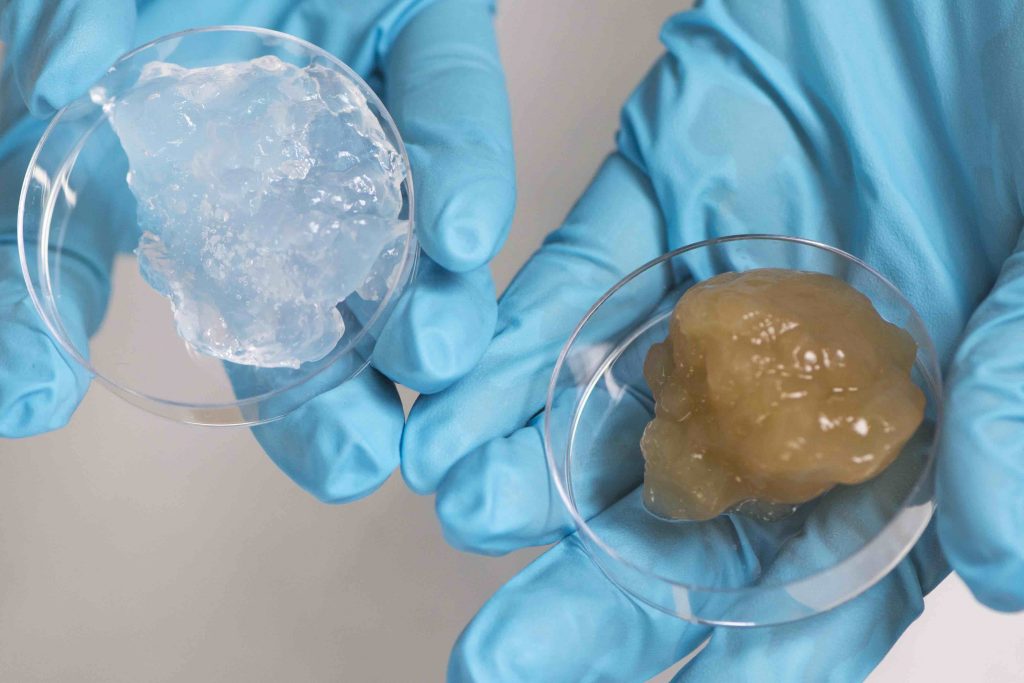
Canadian Bioeconomy Conference and Exhibition announces 2020 dates
June 10, 2019
By Canadian Bioeconomy Conference and Exhibition
 One of the cutting-edge applications of cellulose-based biomass: micro-cellulose hydrogels produced by microfluidization using bleached and unbleached wood fibers. Photo by Valeria Azovskaya.
One of the cutting-edge applications of cellulose-based biomass: micro-cellulose hydrogels produced by microfluidization using bleached and unbleached wood fibers. Photo by Valeria Azovskaya. Canada’s largest and longest-running conference on the bioeconomy will be the place for industry, government, communities, and researchers to meet and discuss some of the greatest challenges facing the nation: climate change, energy security, and truly sustainable economic development.
The Canadian Bioeconomy Conference and Exhibition will take place in Prince George, B.C., June 10-12, 2020.
A long history
“Since the first conference in 2004, the Canadian Bioeconomy Conference and Exhibition has developed a reputation for being one of Canada’s leading conferences on the topic, providing a venue for community leaders, industry members, and policy makers from across Canada and around the world,” said Rob van Adrichem, Chair of the CBCE Board of Directors.
The bioeconomy involves the sustainable production and use of materials, energy, fuels, chemicals and industrial and consumer products from renewable resources instead of fossil fuels. B.C. communities are already at the forefront of the bioeconomy given their local expertise related to forest management and manufacturing capacity for advanced wood building products and bioenergy.
“As the world works to develop economies that are less carbon-intensive and wasteful, the bioeconomy is a tremendous opportunity for B.C. and for Canada,” said van Adrichem. “It has special significance for rural, remote and Indigenous communities, as it uses a readily available resource to create local jobs, energy security, and build economic development.”
Economic opportunity
The Canadian Bioeconomy Strategy reports that more than 21 million metric tonnes of raw biomass was transformed into bioproducts in Canada in 2017 alone. Of that total, 60 per cent came from forestry. Total revenues in 2017 surpassed $4 billion.
The conference host region, North-Central British Columbia, has a long history as a leader in developing the first generation of the industrial bioeconomy in Canada, including the country’s largest pulp and paper cogeneration sector, the first and largest wood pellet-producing industry, and multiple district energy systems, which have virtually eliminated greenhouse gas emissions from the buildings they heat. With projects such as the groundbreaking Canfor-Licella biofuels project, the industry is now moving quickly toward new technologies and new innovations in wood-based products that are fuelling the new bioeconomy.
“Our conference will feature speakers and exhibitors that will showcase the companies and communities that are at the forefront of a global market for bio-based products,” said van Adrichem. “We will continue to bring expertise from around the globe to share knowledge and best practices with Canadian industry members, and to demonstrate B.C.’s leadership role in the Canadian bioeconomy.”
“Prince George is one of the most diversified and important forestry communities in Canada and continued innovation and leadership in this sector is critical to our economic development,” said Prince George Mayor Lyn Hall. “We’re delighted to again be hosting the Canadian Bioeconomy Conference and Exhibition next June.”
Print this page